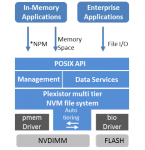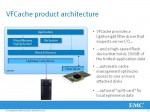I’m really excited about the prospects of memory-addressable flash. Moving flash closer to the CPU and addressing it as memory rather than block storage brings tremendous performance benefits, and is a once-in-a-generation radical change to system architecture. But questions remain as to how it can be integrated with today’s applications. Now Plexistor is here with a promising solution: Their “Software-Defined Memory” concept is a generic filesystem for storage, from NVDIMM to NVMe to SSD.
Virsto
Making a Case For (and Against) Software-Defined Storage
Everyone is talking about “software-defined†everything lately, so it was only a matter of time before industry buzz turned to software-defined storage. VMware and EMC really stoked the flames with a constant barrage of marketing directed in this direction. But how exactly do you software-define storage? And what does this mean?
Where Are They Now? A Tech Field Day Presenter Retrospective
After four years and 34 Tech Field Day events, many of our vendors have gone on to bigger and better things. After seeing today’s acquisition of Xsigo by Oracle, I decided to go back and look at how many of our companies have been acquired over the years.
Solid State Storage Symposium – San Jose, CA
It seems like everything in storage is in flux right now, with virtualization, commoditization, convergence, and solid state disrupting everything. That’s why we at Gestalt IT have decided to host a Symposium on the topic of Solid State Storage: We’ll be bringing in experts from a number of top companies to talk tech, and are inviting anyone interested to attend in person or watch online!
EMC VFCache (aka “Project Lightning”) Is One Small Step, But an Important One
EMC VFCache (née Project Lightning) is a fairly simple offering: A server-based PCIe flash card that acts as a read cache with no integration with storage arrays or hypervisors. But EMC’s entrance into the host-based flash storage market is a powerful demonstration of the wave of disruption caused by flash-based storage and high-performance computing.



